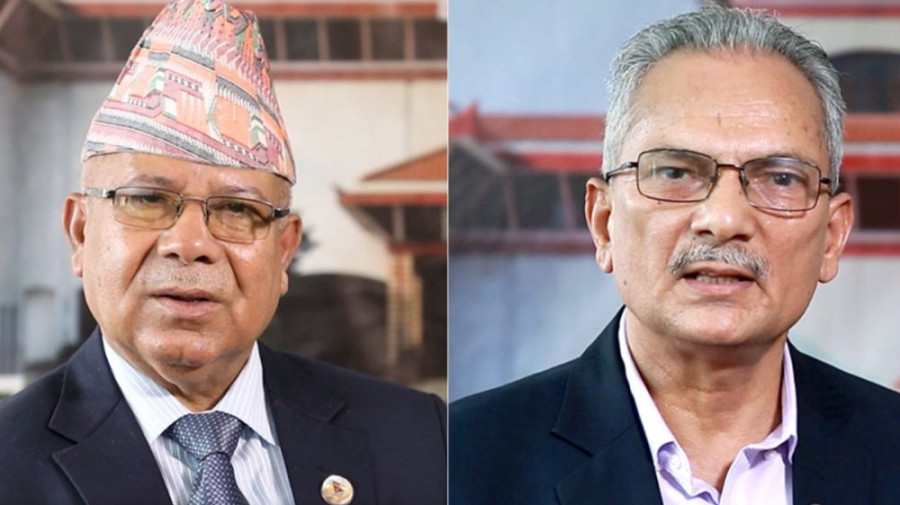Politics
Court clears way for probing ex-PMs in Lalita Niwas scam
Landmark verdict allows police to investigate former prime ministers Madhav Kumar Nepal and Baburam Bhattarai.
Binod Ghimire
The Supreme Court on Sunday cleared the way to investigate those involved in Cabinet decisions to transfer plots of Lalita Niwas land in the name of private individuals.
A division bench of the court directed the home ministry to do so, saying those involved in ‘policy decisions’ must come under the scanner. After hearing a habeas corpus petition filed on behalf of Yograj Paudel, a former civil servant arrested in connection with the scam, a division bench of justices Anil Kumar Sinha and Kumar Chudal said no one involved in making decisions relating to the transfer of land should be spared from the investigation.
The court, however, turned down the petitioner’s demand to release Paudel.
“It is directed to investigate those directly involved in the Cabinet decisions of April 11, 2010, May 14, 2010 along with August 13, 2010 and October 4, 2013, and those involved in implementing the decisions, in addition to those making minister-level decision and executing it," said the court, arguing that those at the top involved in making decisions need to be investigated.
The verdict has opened the door for the police to start investigation against former prime ministers Madhav Kumar Nepal and Baburam Bhattarai. Nepal is the chair of the CPN (Unified Socialist) while Bhattarai heads the Nepal Samajbadi Party.
The Nepal Cabinet had allowed the transfer of government land to individuals. Similarly, the Bhattarai Cabinet had allowed the registration of the land in the name of a fake trust named Pashupati Tikinchha Guthi.
Nepal was prime minister from May 25, 2009 to February 6, 2011. Similarly, Bhattarai was prime minister from August 29, 2011 to March 14, 2012.
Lalita Niwas covers some 300 ropanis (around 15 hectares) of land and includes the prime minister’s residence, Nepal Rastra Bank central office and some other residences of key government officials.
On February 5, 2020, the Commission for Investigation of Abuse of Authority had brought corruption charges against 175 individuals in connection with the land grab.
However, the constitutional anti-graft body had spared a number of key people including former prime ministers Nepal and Bhattarai, even though it admitted that the decisions to illegally transfer the government land into private hands were taken during their tenures.The CIAA had said that the former prime ministers were not implicated as the decisions were the Cabinet’s policy decisions, over which it has no jurisdiction. Policy decisions refer to decisions made by political parties based on their election manifestos, based on which they contest elections.
The commission did not implicate Nepal and Bhattarai based on Section 4 of the Commission for Investigation of Abuse of Authority Act, which says the anti-graft body cannot investigate “policy decisions” of the Cabinet or the committees under it.
The Central Investigation Bureau of the Nepal Police has arrested 20 individuals in connection with the scam and is looking into their possible involvement in the case.
Based on its preliminary investigation, the bureau on June 27 arrested seven individuals including former election commissioner Sudhir Shah, Bhatbhateni Supermarket owner Min Bahadur Gurung, and former employees of Land Revenue Office Dharma Prasad Gautam after finding their involvement in the scam.
Though it had also arrested Secretary at the Ministry of Communication and Information Technology Krishna Bahadur Raut, he got conditional release following a Supreme Court order.
Legal experts say different government agencies thus far had exempted decision makers in the Cabinet by wrongly interpreting the law, arguing that policy decisions could not be questioned, and that the court has now corrected their wrong interpretation.
"It is a groundbreaking decision issued in line with the spirit of the rule of law. The court has clearly said the decision makers should be brought under investigation, not just the bureaucrats who execute decisions," senior advocate Dinesh Tripathi told the Post. "The court has established that the political leadership must take ultimate responsibility for such decisions."




 9.7°C Kathmandu
9.7°C Kathmandu














